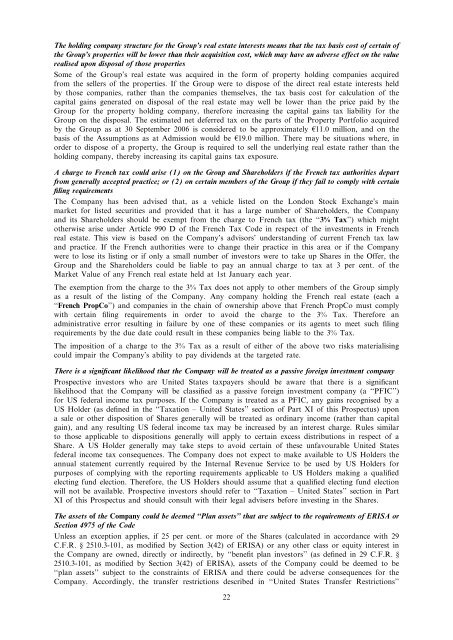You also want an ePaper? Increase the reach of your titles
YUMPU automatically turns print PDFs into web optimized ePapers that Google loves.
The holding company structure for the Group’s real estate interests means that the tax basis cost of certain of<br />
the Group’s properties will be lower than their acquisition cost, which may have an adverse effect on the value<br />
realised upon disposal of those properties<br />
Some of the Group’s real estate was acquired in the form of property holding companies acquired<br />
from the sellers of the properties. If the Group were to dispose of the direct real estate interests held<br />
by those companies, rather than the companies themselves, the tax basis cost for calculation of the<br />
capital gains generated on disposal of the real estate may well be lower than the price paid by the<br />
Group for the property holding company, therefore increasing the capital gains tax liability for the<br />
Group on the disposal. The estimated net deferred tax on the parts of the Property Portfolio acquired<br />
by the Group as at 30 September 2006 is considered to be approximately A11.0 million, and on the<br />
basis of the Assumptions as at Admission would be A19.0 million. There may be situations where, in<br />
order to dispose of a property, the Group is required to sell the underlying real estate rather than the<br />
holding company, thereby increasing its capital gains tax exposure.<br />
A charge to French tax could arise (1) on the Group and Shareholders if the French tax authorities depart<br />
from generally accepted practice; or (2) on certain members of the Group if they fail to comply with certain<br />
filing requirements<br />
The Company has been advised that, as a vehicle listed on the London Stock Exchange’s main<br />
market for listed securities and provided that it has a large number of Shareholders, the Company<br />
and its Shareholders should be exempt from the charge to French tax (the ‘‘3% Tax’’) which might<br />
otherwise arise under Article 990 D of the French Tax Code in respect of the investments in French<br />
real estate. This view is based on the Company’s advisors’ understanding of current French tax law<br />
and practice. If the French authorities were to change their practice in this area or if the Company<br />
were to lose its listing or if only a small number of investors were to take up Shares in the Offer, the<br />
Group and the Shareholders could be liable to pay an annual charge to tax at 3 per cent. of the<br />
Market Value of any French real estate held at 1st January each year.<br />
The exemption from the charge to the 3% Tax does not apply to other members of the Group simply<br />
as a result of the listing of the Company. Any company holding the French real estate (each a<br />
‘‘French PropCo’’) and companies in the chain of ownership above that French PropCo must comply<br />
with certain filing requirements in order to avoid the charge to the 3% Tax. Therefore an<br />
administrative error resulting in failure by one of these companies or its agents to meet such filing<br />
requirements by the due date could result in these companies being liable to the 3% Tax.<br />
The imposition of a charge to the 3% Tax as a result of either of the above two risks materialising<br />
could impair the Company’s ability to pay dividends at the targeted rate.<br />
There is a significant likelihood that the Company will be treated as a passive foreign investment company<br />
Prospective investors who are United States taxpayers should be aware that there is a significant<br />
likelihood that the Company will be classified as a passive foreign investment company (a ‘‘PFIC’’)<br />
for US federal income tax purposes. If the Company is treated as a PFIC, any gains recognised by a<br />
US Holder (as defined in the ‘‘Taxation – United States’’ section of Part XI of this Prospectus) upon<br />
a sale or other disposition of Shares generally will be treated as ordinary income (rather than capital<br />
gain), and any resulting US federal income tax may be increased by an interest charge. Rules similar<br />
to those applicable to dispositions generally will apply to certain excess distributions in respect of a<br />
Share. A US Holder generally may take steps to avoid certain of these unfavourable United States<br />
federal income tax consequences. The Company does not expect to make available to US Holders the<br />
annual statement currently required by the Internal Revenue Service to be used by US Holders for<br />
purposes of complying with the reporting requirements applicable to US Holders making a qualified<br />
electing fund election. Therefore, the US Holders should assume that a qualified electing fund election<br />
will not be available. Prospective investors should refer to ‘‘Taxation – United States’’ section in Part<br />
XI of this Prospectus and should consult with their legal advisers before investing in the Shares.<br />
The assets of the Company could be deemed ‘‘Plan assets’’ that are subject to the requirements of ERISA or<br />
Section 4975 of the Code<br />
Unless an exception applies, if 25 per cent. or more of the Shares (calculated in accordance with 29<br />
C.F.R. § 2510.3-101, as modified by Section 3(42) of ERISA) or any other class or equity interest in<br />
the Company are owned, directly or indirectly, by ‘‘benefit plan investors’’ (as defined in 29 C.F.R. §<br />
2510.3-101, as modified by Section 3(42) of ERISA), assets of the Company could be deemed to be<br />
‘‘plan assets’’ subject to the constraints of ERISA and there could be adverse consequences for the<br />
Company. Accordingly, the transfer restrictions described in ‘‘United States Transfer Restrictions’’<br />
22


